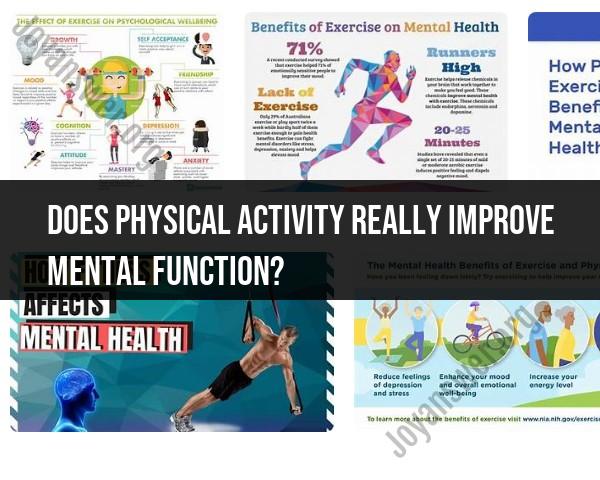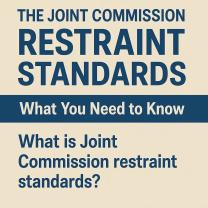Does physical activity really improve mental function?
Yes, physical activity has been shown to have several positive effects on mental function and overall cognitive health. Here are some of the ways in which physical activity can improve mental function:
Enhanced Cognitive Abilities: Regular physical activity, such as aerobic exercise, has been associated with improved cognitive functions such as memory, attention, and problem-solving skills. Exercise increases blood flow to the brain, which can promote the growth of new neurons and enhance neural connections.
Mood Regulation: Physical activity can stimulate the release of endorphins and other "feel-good" neurotransmitters in the brain, which can help reduce stress, anxiety, and symptoms of depression. It can also improve mood and emotional well-being.
Stress Reduction: Exercise has been found to be an effective stress-reduction strategy. It helps the body and mind cope with stress by reducing the levels of stress hormones, such as cortisol.
Improved Sleep: Regular physical activity can lead to better sleep quality and duration, which is essential for cognitive function and emotional well-being. Sleep is when the brain consolidates memories and processes information.
Neuroplasticity: Exercise may enhance neuroplasticity, which is the brain's ability to adapt and change. This can lead to improved learning and memory.
Brain Health and Aging: There is evidence to suggest that physical activity can help protect the brain from age-related cognitive decline. It may lower the risk of neurodegenerative diseases like Alzheimer's.
Increased Alertness: Physical activity can increase alertness and energy levels, making individuals more focused and mentally sharp.
Social Interaction: Many forms of physical activity involve social interaction, which can boost mental well-being by reducing feelings of isolation and providing a sense of community.
It's important to note that the relationship between physical activity and mental function is complex and can vary depending on the individual, the type and intensity of exercise, and other factors. However, numerous studies have shown a positive association between regular physical activity and improved cognitive and mental health.
To maximize the mental benefits of physical activity, it's recommended to engage in a combination of aerobic exercise, strength training, and activities that you enjoy. It's also important to maintain a consistent exercise routine for long-term benefits. However, if you have specific mental health concerns or conditions, it's advisable to consult with a healthcare professional for a tailored approach to incorporating exercise into your overall mental health strategy.
The Impact of Physical Activity on Mental Function
Physical activity has a profound impact on mental function. Research has shown that regular exercise can improve cognitive function, including memory, attention, processing speed, and executive function. Exercise can also improve mood, reduce stress, and boost self-esteem.
Cognitive Benefits and Exercise: What Science Reveals
Scientists are still learning about the exact mechanisms by which exercise improves cognitive function. However, some possible explanations include:
- Increased blood flow to the brain: Exercise gets the blood pumping, which delivers more oxygen and nutrients to the brain. This can improve brain cell function and promote the growth of new brain cells.
- Reduced inflammation: Exercise can help to reduce inflammation throughout the body, including in the brain. Inflammation has been linked to cognitive decline and other brain disorders.
- Increased production of neurotransmitters: Exercise stimulates the production of neurotransmitters, such as dopamine, serotonin, and norepinephrine. These neurotransmitters play a role in mood, motivation, and cognitive function.
Brain Health and Cognitive Enhancement through Activity
Regular exercise can help to improve brain health and cognitive function at all ages. For children and adolescents, exercise can help to improve academic performance and cognitive development. For adults, exercise can help to maintain cognitive function and reduce the risk of age-related cognitive decline.
Physical Activity as a Tool for Cognitive Resilience
Cognitive resilience is the ability to bounce back from mental challenges, such as stress, trauma, or brain injury. Exercise can help to improve cognitive resilience by strengthening the brain's networks and making it more adaptable to change.
Unlocking Mental Potentials with a Physically Active Lifestyle
A physically active lifestyle can help to unlock your mental potential. By improving cognitive function, mood, and stress levels, exercise can help you to think more clearly, learn more effectively, and perform better at work and school.
How to Get Started with a Physically Active Lifestyle
If you are new to exercise, start slowly and gradually increase the intensity and duration of your workouts over time. Aim for at least 30 minutes of moderate-intensity exercise most days of the week. There are many different types of exercise that you can enjoy, such as walking, running, biking, swimming, dancing, and playing sports. Find an activity that you enjoy and that fits into your lifestyle.
If you have any health concerns, be sure to talk to your doctor before starting a new exercise program.













